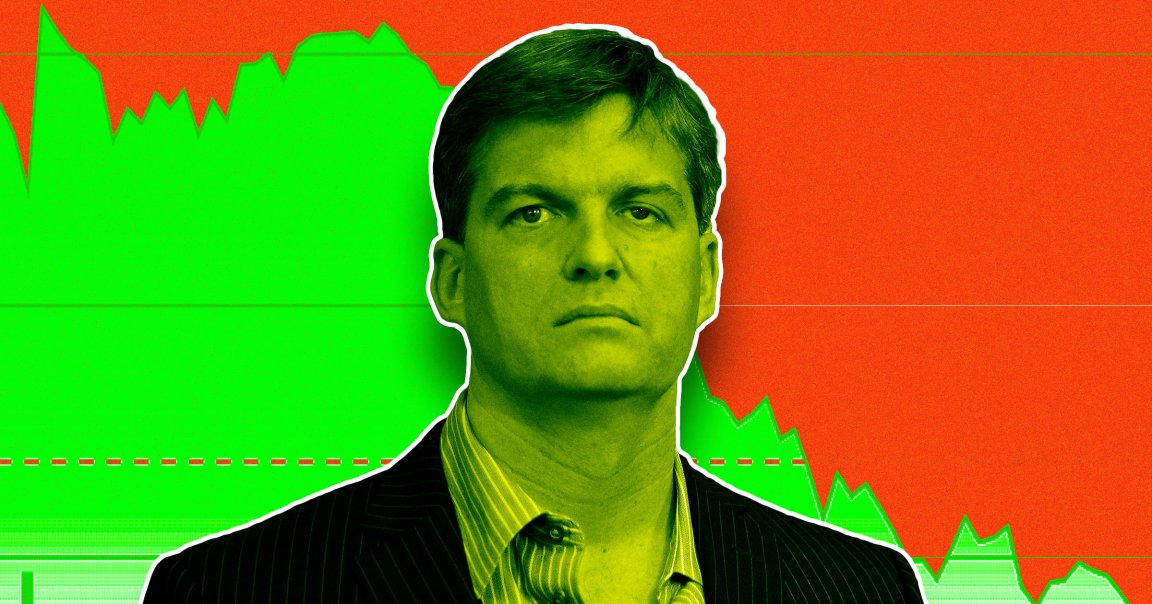
Michael Burry, who famously shorted the US housing market before its collapse in 2008, has bet over $1 billion that the share prices of AI chipmaker Nvidia and software company Palantir will fall — making a similar play, in other words, on the prediction that the AI industry will collapse.
According to the Securities and Exchange Commission filings, his fund, Scion Asset Management, bought $187.6 million in puts on Nvidia and $912 million in puts on Palantir, as CNN reports.
Burry similarly made a long-term $1 billion bet from 2005 onwards against the US mortgage market, anticipating its collapse. His fund rose a whopping 489 percent when the market did subsequently fall apart in 2008.
It’s a major vote of no confidence in the AI industry, highlighting growing concerns that the sector is growing into an enormous bubble that could take the US economy with it if it were to lead to a crash.
“This new disclosure suggests that he now believes that there is an AI bubble which is due to pop,” Quiver Quantitative cofounder James Kardatzke told The Telegraph.
Investors have poured tens of billions of dollars into firms like Nvidia and Palantir, ballooning their valuations to historic levels. Nvidia recently closed with a market cap of $5.04 trillion, becoming the first company ever to cross the $5 trillion threshold. Palantir’s market cap is also up over 150 percent year-to-date. Its current valuation is upwards of 200 times its forward earnings, spreading fears that it may be grossly overvalued.
The news of Burry’s latest short comes amid a significant AI tech selloff. Shares of Nvidia and Palantir dropped just under four percent and nine percent respectively on Tuesday, indicating shaky confidence that AI companies will be able to justify their enormous valuations due to flagging revenue growth.
Investors are also growing skeptical as the AI industry turns to making major deals amongst each other; circular financing that has further stoked fears of an AI bubble. Experts have been predicting a reality check for a tech-heavy stock market that has ballooned out of proportion.
Burry is clearly in his element. Last week, he posted on X-formerly-Twitter for the first time in two years, with a picture of actor Christian Bale, who portrayed him in the 2015 film, “The Big Short.”
“Sometimes, we see bubbles,” he wrote in the caption. “Sometimes, there is something to do about it. Sometimes, the only winning move is not to play.”
Four days later, Burry disclosed that he’d bet against Nivida and Palantir.
As CNN points out, Burry’s track record isn’t perfect. For instance, he called in January 2023 to “sell” in a now infamous tweet, only to admit that he was “wrong” two months later. At the time, the Nasdaq 100 index entered a bull market, surging by more than 21 percent between December 2022 and March 2023.
Nonetheless, given his pivotal call to short the US housing market certainly gives his latest dire warning about an AI bubble some gravitas. Even with Palantir beating Wall Street expectations in its latest quarterly earnings, the company is feeling the pressure this week.
“Despite the great results, when you coincide that with the comments that Michael Burry made and everybody already talking about concerns about an AI bubble, I think the combination of those factors really helped drive a pullback in the shares, the broader tech index and as a result the broader markets,” CFRA Research tech analyst Angelo Zino told CNN.
“We’re not overly concerned about the pullback, but I would say it’s one of those situations where you’ve got to keep an eye on it,” he added.
Meanwhile, Palantir CEO Alex Karp was scandalized by Burry’s major bet against the AI industry.
“The two companies he’s shorting are the ones making all the money, which is super weird,” he told CNBC today. “The idea that chips and ontology is what you want to short is bats*** crazy.”
Karp, though, was clearly using his media appearance to reassure spooked investors.
“It’s crazy motivating,” Karp added. “Every time they short us, we are just like tripling down on getting the better numbers, in part honestly, to make them poorer.”
More on the short: Don’t Panic, But AI Stocks Are Suddenly Lurching Downward